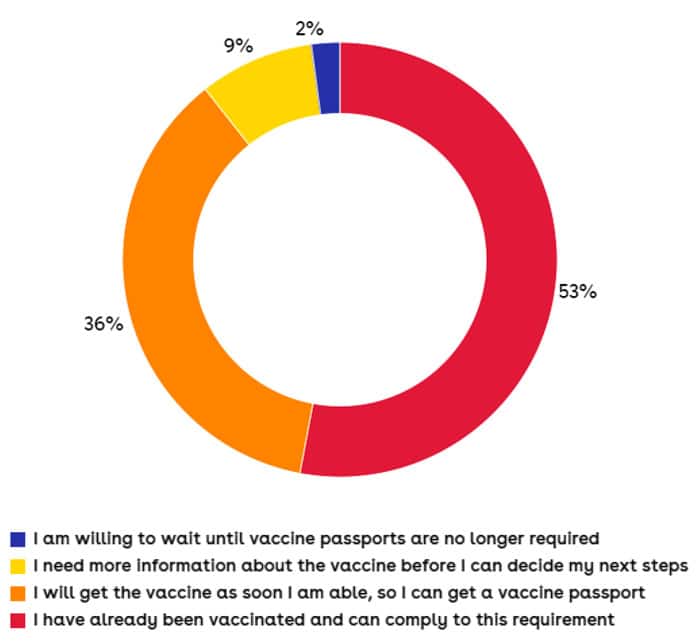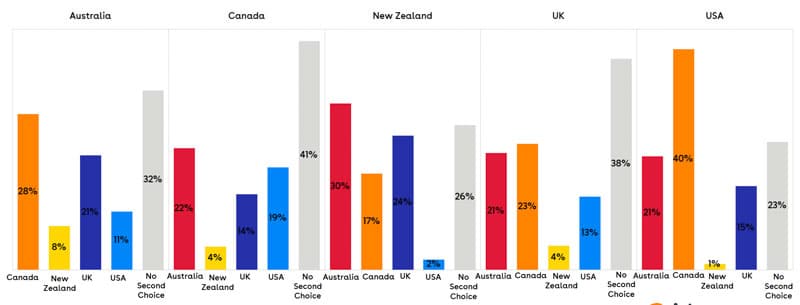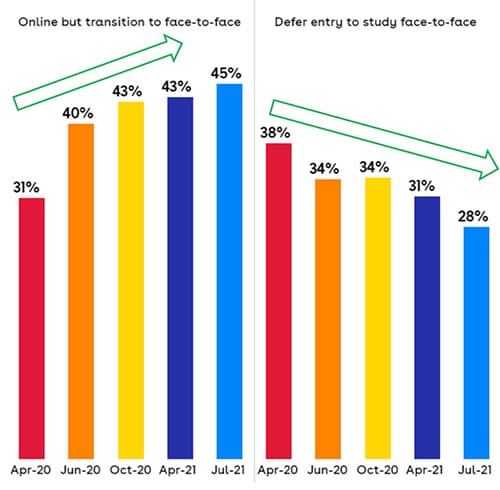Survey: Students embrace vaccines when planning for study abroad
- The latest Crossroads survey from IDP found that significant proportions of students have been vaccinated in some key sending markets – as well as substantial willingness to being vaccinated among those who haven’t yet been
- Students’ generally positive attitudes towards vaccination is linked to their desire to be eligible to receive a vaccine passport that could allow them to travel to preferred destinations
- Some nationalities indicated that access to vaccines is a problem, and they were especially likely to say that the ability to receive a vaccine upon arrival in a destination country would make that country more attractive to them
IDP recently released the fifth instalment of its ongoing survey programme, Crossroads, which has gauged the study abroad intentions and attitudes of students in more than 20 countries throughout the pandemic. The latest survey was conducted in July 2021 and received responses from 4,000 international student applicants, offer holders, and current students. In general, the survey found a strong level of intention among students to study abroad, with 79% expecting to begin their studies as planned.
Some of the most notable findings concern students’ behaviours and ideas around vaccines – specifically whether they had been vaccinated, whether they were willing to be vaccinated, and if they were interested in receiving vaccines upon arrival in a destination country. This is a new area of the Crossroads research and is naturally very relevant to educators faced with the challenge of enrolment management and campus safety this fall.
Encouragingly, students were very willing to take all necessary steps – from vaccination to quarantine – to be able to study abroad. Fully 88% of students would prefer quarantine over deferring the start of their overseas study.
About the survey
Indian students made up more than half of the more than 4,000 respondents, and there were also significant numbers of respondents in countries such as Vietnam, China, Indonesia, Malaysia, Bangladesh, Philippines, and Sri Lanka. Student-respondents were either studying in or considering studying in one of the main English-language destinations of Australia, Canada, New Zealand, the UK, and the US.
Attitudes towards vaccinations: the highlights
- More than half (53%) of students had already been vaccinated, compared with only 9% in the last survey cycle in April 2021.
- More than a third (36%) would receive the vaccine as soon as they were able to in order to receive a vaccine passport, down from 55% in April. We can assume that this decline is linked to more students now having received the vaccine.
- Only 9% said they needed more information about the vaccine before they could consider next steps, down from 30% who said the same in April. Vaccine hesitancy is clearly declining.
- There were striking differences in proportions of students who had received the vaccine across sending markets – which of course has important implications for recruiters. At least half of students from India (65%), China (65%), Singapore (67%), Hong Kong (54%), and Indonesia (58%) were vaccinated. By contrast, only 8% of Vietnamese had received a full programme of vaccines, and only 30% of Bangladeshi students had – but there was also very strong demand for vaccines in these two markets.

- At least three-quarters of students said that the ability to receive vaccines upon arrival in a destination country would make that destination more attractive to them. This is especially important in some markets, since less than half of students in Vietnam, Bangladesh, Nepal, Taiwan, and the Philippines said they were confident they could receive a vaccine in their home countries to be able to comply with a potential vaccine requirement.
Measuring destination attachment
Many prospective students (36%) were open to changing their minds about where they would go, depending on whether face-to-face instruction was available. For those considering an alternative destination to their first choice, Canada was very often the second choice – especially for students whose first choice was the US. Canada also commands greater brand loyalty than the other destinations at this time, with the lowest percentage of students saying would consider another destination.
That said, perceptions of the US have become notably more favourable in the most recent instalments of the survey, in no small part because of the change of administration in the US.

Attitudes towards online study
Compared to previous survey cycles, the latest edition of Crossroads find that students are slightly more open to beginning their studies online and then transitioning to face-to-face instruction. As the following chart reflects, a correspondingly smaller proportion of students said that they would defer their programme starts until face-to-face study was available.

For additional background, please see:
















